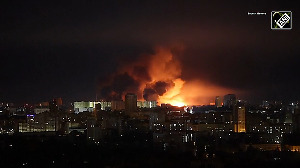'Every director is subject to some kind of pressure,' former CBI director Dr R K Raghavan tells Rediff.com's Shobha Warrier. 'Ultimately, it all depends on the individual and the maturity and sense of fair play of the director.'
'It is up to the director to cope with the pressure and if he is a man of character, he can.'
Dr R K Raghavan, former director of the Central Bureau of Investigation, belongs to the 1963 batch of the Indian Police Service. He was the Director General of Police, Tamil Nadu, when he was chosen to head India's premier investigative agency.
After his retirement, he was appointed chairman of the Supreme Court-appointed Special Investigative Team that investigated the 2002 Gujarat riots and later exonerated state Chief Minister Narendra Modi.
The former CBI director spoke to Rediff.com's Shobha Warrier about why the Bureau needs autonomy.
The trust people had in the CBI has gone down drastically in the last six years or so, especially after the 2G scam, coal scam, Commonwealth Games scam, etc.
I would only partially agree with you when you say the common man's trust in the CBI has gone down over the years. It is very difficult to say accurately whether it has gone up or gone down.
More and more cases are entrusted to the CBI by the courts. There is also the demand from the public that the CBI should investigate wherever there is a controversy. So, there is a contradiction here.
On one hand, people say they no longer trust the CBI as they felt the CBI was being run by the ruling party. On the other hand, there is a demand from the public for the CBI to probe controversial happenings.
Wherever there is no politics involved, people feel the case should be handled by a neutral agency like the CBI rather than the police.
That is why I said there is a kind of contradiction here. Where there is no direct political involvement, people still trust the efficiency of the CBI. The same applies to the courts as well.
There is basically no complaint about the quality of the CBI's work. The popular feeling is that the government's stranglehold over the CBI does not permit it to act to its full potential, independently and fearlessly.
The government's failure to accord autonomy and freedom of action has directly affected the CBI's image.
Of late, the Supreme Court has been monitoring certain cases entrusted to the CBI, asking the agency to report directly to the court...
That is because the court feels the CBI would be under pressure from the government. So, wherever the court feels the CBI would likely to be under pressure, they say they would monitor it.
This is similar to what happened to the hawala case when the then prime minister (P V) Narasimha Rao's involvement was suspected and the court felt the agency would not be able to work independently.
This arrangement has been working reasonably well, and because the court is monitoring, the investigation gains more credibility.
Because the CBI director is appointed by the government and the agency's financial needs are met by the government, the government has a stranglehold over the CBI.
If they want more cars, more travel abroad, it is the government which holds the purse strings. Naturally, the government has a huge hold over the organisation.
Has the situation always been like this?
My perception is that in the past two or three decades, there is greater and greater interference in the CBI's activities by various governments.
When did the deterioration start?
You can't specifically say when. The general impression is that it has deteriorated very badly in recent times. This is sad.
We do not know when we will have a government that is enlightened enough to reverse the drift.
Why has the situation been deteriorating like this, according to you?
That is a reflection of the nature of current politics.
People get the impression that the ruling parties use the CBI to settle political scores. Is it true?
The impression that the CBI is being used to settle political ends is partially true. I would not like to name names.
Yes, the general feeling is that as the government has so much control over the CBI, it is but natural that their own people and their friends are protected by giving directions to the CBI.
This is the reason why courts have started monitoring investigations.
Many feel the reason for the lack of trust is due to lack of governance. Do you agree with this observation?
Lack of governance is a very vague expression. I don't think anybody can explain what lack of governance is. It is due to the deterioration in the general value system in society and that is reflected in the government and its organs like the CBI.
The Guwahati high court ruling says the CBI does not have the authority to arrest any accused. What kind of implications will it have on cases taken up by the CBI?
The Guwahati ruling did come as a bolt from the blue. Fortunately, it has been stayed by the Supreme Court. Otherwise, it would have paralysed all current investigations, and raised a big question mark on the legality of past investigations.
The Guwahati court has taken a particular view and it has been challenged by the government. Now both of them will have to argue before the Supreme Court. Till the Supreme Court gives the ruling after hearing the petitioner and the government, we cannot say anything.
We do not know whether the ruling will stay or be reversed. It is not desirable to speculate just now.
Do you feel it was a landmark judgement?
It is a very welcome judgment and has raised many fundamental issues on the legality of the CBI. It is better that that is thrashed out now and the Supreme Court gave the final ruling.
In your opinion, could the government issue an ordinance to ratify all acts of the CBI and protect its status as a police force to avoid the adverse effect from the high court ruling?
The government is well within its right to issue an ordinance clarifying all the powers enjoyed by the CBI. However, this would have to take the form of a regular CBI Act.
In an affidavit filed in the Supreme Court, the Centre said the CBI director cannot be given the ex-officio power of secretary as it will amount to vesting unbridled power in one authority.
It also opposed providing autonomy to the CBI.
I am not surprised that the government has taken the position that it took in denying autonomy to the CBI and rejecting the demand that the director should enjoy the powers vested in a full-fledged secretary to the Government of India. There is a certain bias that operates here.
Recently, both the prime minister and finance minister questioned the way the CBI is functioning...
Yes, it could have been avoided. It could demoralise the CBI.
The prime minister specifically said the CBI had no authority to question policies. What if the policies are detrimental to the country or made in a corrupt manner?
The line dividing 'policy' from a routine administrative act is thin indeed. It is very difficult for the CBI to be always conscious of this, and if it transgresses the distinction by mistake, it cannot be faulted.
Perhaps the Supreme Court can explain how exactly this happens. Ultimately, we have to get help from the court.
The government has accused the CBI of crossing the line.
Where do you draw the line?
It is very difficult for me to say anything specific on this. A policy guideline is very broad and sometimes vague, but administrative acts are specific.
When an administrative act violates policy, then there is a problem.
The government is not for autonomy for the CBI, but people feel the investigating agency should have autonomy...
Autonomy is not the solution for all evils. But with more autonomy, the CBI will become more professional, there will be more adherence to law, procedure and the Constitution and it will not work in favour of the ruling party.
I won't say it will solve all problems, but it will be better than now.
How important is it for the CBI to have autonomy?
Autonomy and performance usually go hand-in-hand. These are days of complaints against people in high places inside and outside government.
If these individuals have to be investigated, there is no alternative but to ensure that CBI is an autonomous body that exercises all the powers conferred on it by the criminal law of the land without fear or favour.
Is there any ideal situation for the CBI to function?
I have said in various fora that the power to conduct the preliminary inquiry should be with the CBI and that it should not be at the mercy of the government.
Then, it should have the power to register a case without waiting for the government's approval.
It should have the power to file a chargesheet in the court against an individual without sanctions from the government.
It should have the power to appeal against acquittal without depending on the approval from the government.
Can you name any such investigating agency that functions without being in the control of the government?
The FBI (Federal Bureau of Investigation) in the US, to a large extent, has been kept out of the purview of the executive authority. I know the FBI enjoys a lot of independence and it is not at the mercy of the (American) president for any preliminary inquiry.
The Supreme Court recently commented the CBI is a 'caged parrot.' Is it?
The Supreme Court's depiction of the CBI was most appropriate, and no one can take umbrage at it.
With the kind of constraints on it, the organisation is rightly viewed as a 'caged parrot.'
The image that the CBI has is that it is an appendage of the government. Is it true?
This impression is true to a large extent. A lot depends upon the CBI leadership.
When you were director of the CBI, did you face political pressures?
Every director is subject to some kind of pressure. Ultimately, it all depends on the individual and the maturity and sense of fair play of the director.
You have to have balance. It is up to the director to cope with the pressure and if he is a man of character, he can.
How did you cope with the pressure?
You listen to people and take your own decisions according to your conscience and according to the law.
There is a tendency for the government to give you instructions, but it is for you to examine the instructions and decide whether they are ethical and in accordance to the law and then take your own decisions.
The director should not blindly obey the government or blindly oppose the government. Ultimately, a lot depends on the maturity of the director and his moral fibre.
How much independence did you have when you were the CBI director?
I enjoyed a reasonable degree of independence although I would have liked to have been much more of an independent entity.
Image: Dr R K Raghavan. Photograph: Sreeram Selvaraj











